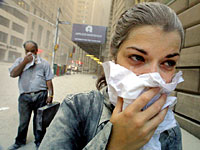
WEDNESDAY, September 7, 2011 (Health.com) — People exposed to the terror and dust of the 2001 attacks on the World Trade Center have higher rates of asthma and post-traumatic stress than those who were further away from Ground Zero. But they also have high rates of a less obvious health problem: heartburn.
A new study of more than 37,000 adults who worked at Ground Zero or lived near the site found that one-fifth experienced heartburn, indigestion, or acid reflux for the first time ever in the three years following the 9/11 attacks. Five to six years after the disaster, 13% were still experiencing these common symptoms of gastroesophageal reflux disease, or GERD.
The rates were even higher among rescue and recovery workers: One-third reported the onset of GERD-like symptoms by 2004, and one-quarter still had symptoms up to three years later.
The findings come as no surprise, since acid reflux—the seepage of stomach acids and other contents into the esophagus—frequently occurs side by side with asthma or stress, including post-traumatic stress disorder (PTSD).
“Even relatively minor stress can produce slow stomach emptying,” says Charlene Prather, MD, a professor of gastroenterology at the Saint Louis University School of Medicine, in Missouri. “And if the stomach isn’t emptying properly, then there are more materials that can reflux into the esophagus.”
A 2005 study in the Journal of Psychosomatic Research found that people with chronic heartburn and acid reflux who were asked to deliver a five-minute speech in front of an audience experienced an acute worsening of their symptoms, unlike a group with identical preexisting symptoms and acid levels that did not have to speak.
If the fleeting butterflies that come with public speaking can trigger acid reflux, it stands to reason that the persistent stress of PTSD can affect the gut as well.
And sure enough, in the new study, rescue workers and people who lived or worked in the vicinity of the World Trade Center were at higher risk of acid reflux if they also had PTSD, a type of anxiety disorder. By 2006 or 2007, just under one-quarter of the study participants who had PTSD were experiencing acid reflux symptoms, compared to 8% of those who had neither PTSD nor asthma.
Next page: Serotonin may play a role





